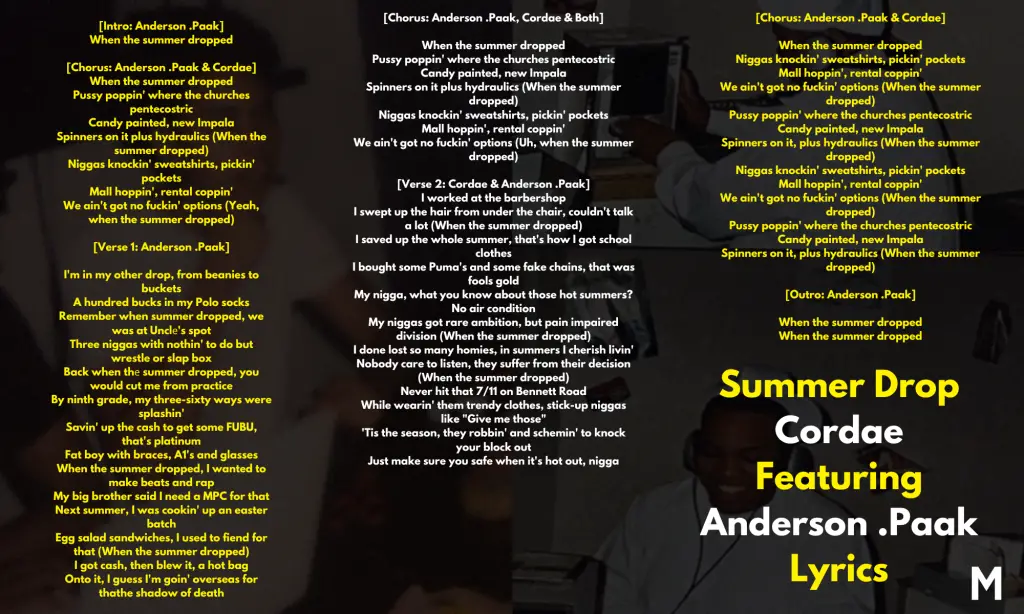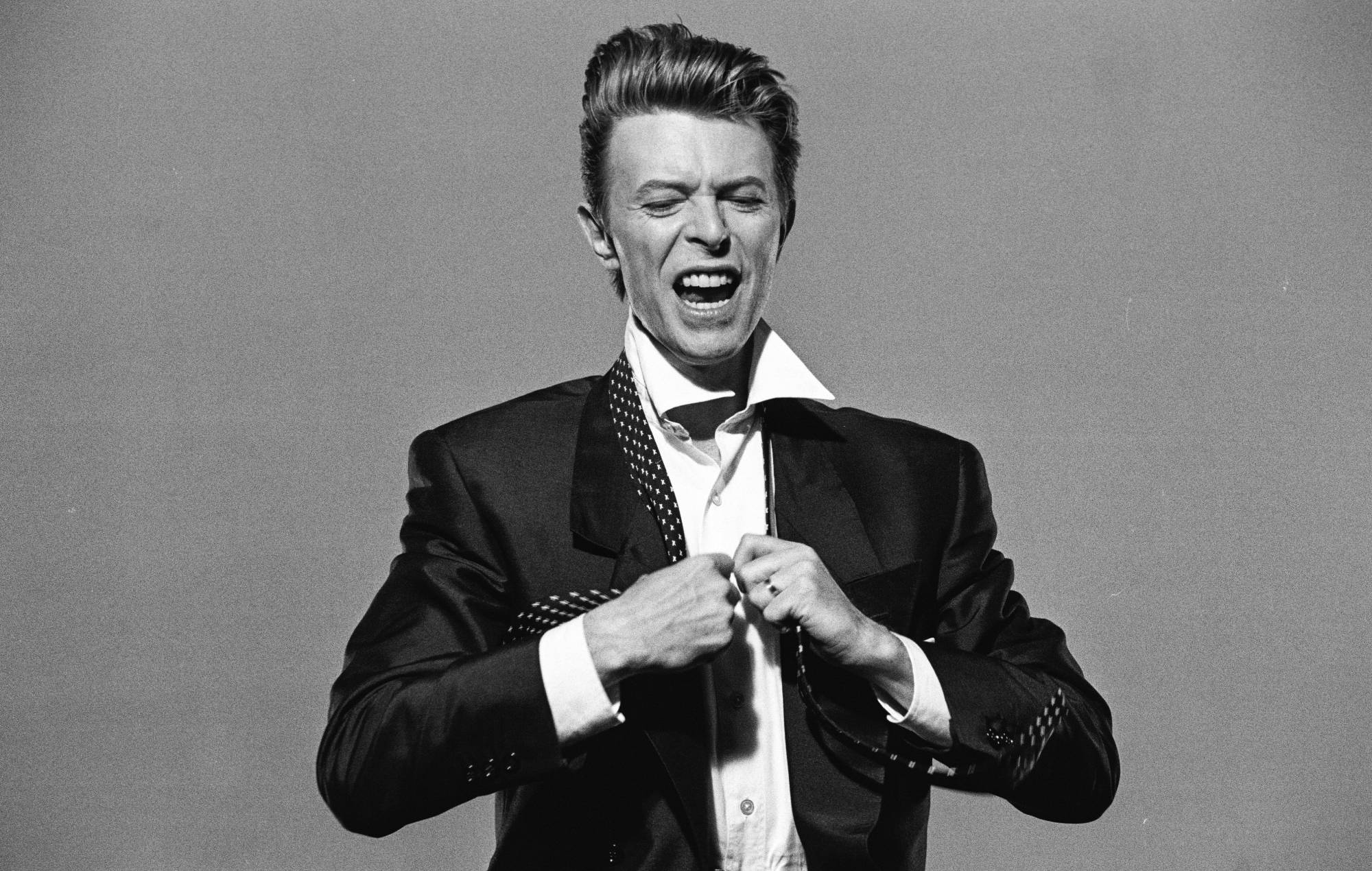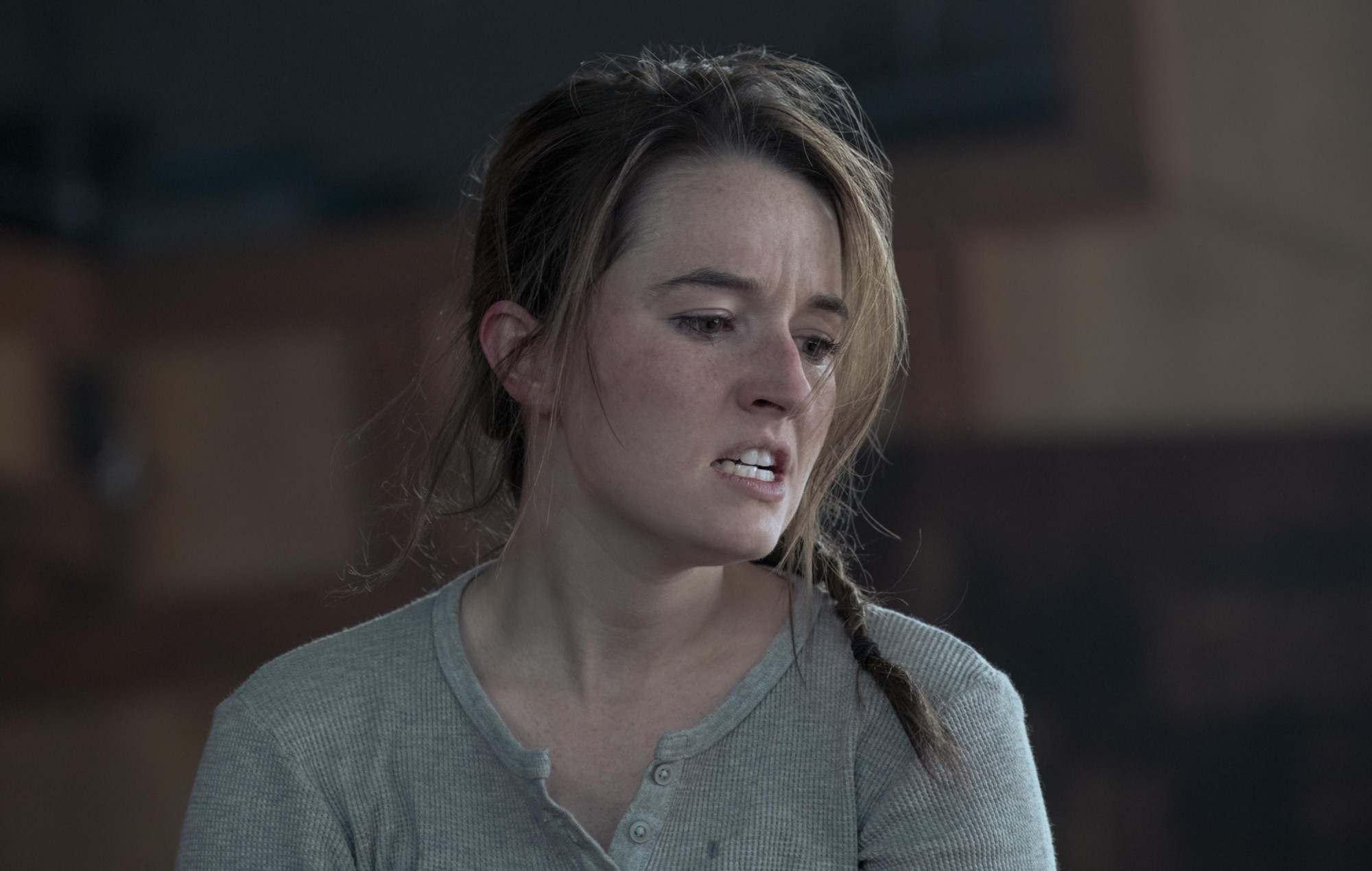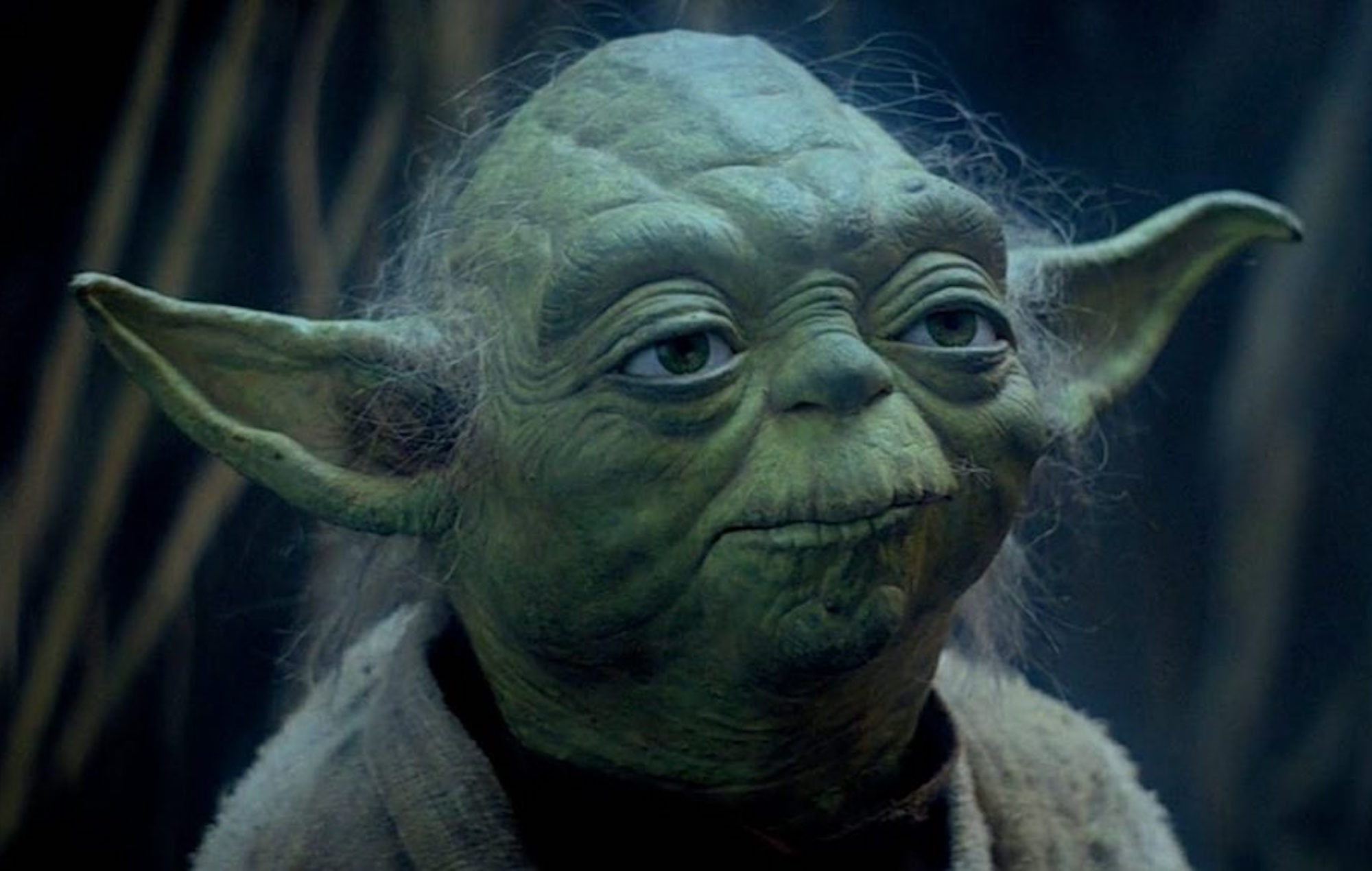Table of Contents
Cordae’s latest track, “Summer Drop,” featuring Anderson .Paak and produced by J. Cole, is a sharp reflection on the complexities of youth. What might look like just another summer record on first glance quickly shows that there’s more going on than meets the eye and, in truth, is more of a reflective, if not nostalgic, walk down memory lane of the realities that shaped both artists, blending memories of carefree moments with the tougher experiences of growing up.
To fully understand the depth of “Summer Drop,” we’ve pulled together insights from interviews and background information on both Cordae and Anderson .Paak. These details provide a contextual backdrop, helping to shed a bit more light on the deeper layers within the song. Cordae uses this track to unpack the dualities of his past, offering a clear-eyed view of the pride and struggles that defined his formative years.
“Summer Drop,” is a direct, raw, and unfiltered look at the summers that shaped him, brought to life with the assistance of Anderson .Paak’s smooth delivery and J. Cole’s S-Tier production.
[embed]https://youtube.com/watch?v=uK2kqW0_6Tg&si=UhTUCzz_tnX_XvuL[/embed]Cordae Summer Drop Lyrics

“Summer Drop” by Cordae & Anderson.Paak Meaning
“When the summer dropped, pussy poppin’ where the churches pentecostric / Candy painted, new Impala / Spinners on it plus hydraulics.”
These opening lines immediately caught my attention. Anderson .Paak paints a picture that blends the sacred with the secular, showing how summer in their world is, or at least was, a time of contrasts back then. There’s something powerful about the imagery of “pussy poppin’” juxtaposed with churches, especially in Maryland where the power of the church holds far more sway over the local politics and culture than most other places across the country; the only institution to successfully outline empires. It’s a reminder that these environments are complex, where celebrations, struggles, outward piety, and inward Salaciousness often coexist.
I think this reflects a lot of the duality in their experiences growing up.
Cordae has talked about how important it was to find his identity in Maryland, saying in a recent interview with the Grammys, “I became who I am in Maryland. You just can’t be in Maryland and be lame. You gotta be cool, you gotta be fly, you gotta be yourself.” I connect this sentiment and the pride they show in things like the “Candy painted, new Impala.”
For them, cars are more than just vehicles—they’re symbols of status, pride, and identity.
“When the summer dropped, you would cut me from practice / By ninth grade, my three-sixty waves were splashin’ / Savin’ up the cash to get some FUBU, that’s platinum.”
As I listen to Anderson .Paak’s verse, I can’t help but be transported back to the simpler, yet defining moments of youth. The line about being “cut from practice” feels so real—it’s a small moment that many of us can relate to, where the sting of rejection hits hard. But then, there’s this pride in his “three-sixty waves” and the excitement of saving up for FUBU.
It’s clear that these experiences shaped who he is today.
Anderson .Paak has always been about authenticity, and I see that here in how he reminisces about these cultural touchstones. FUBU is more a way to belong than a brand. These small details show how culture and personal history intertwine, shaping not just how he saw himself, but how he navigated the world around him.
“My n***a, what you know about those hot summers? No air condition / My n****s got rare ambition, but pain impaired vision.”
Cordae’s verse really hits home for me. He’s not just talking about physical heat; he’s talking about the heat of pressure, of struggle. The line “No air condition” acts as a metaphor for the lack of comfort in his life, both physically and emotionally.
In one of his interviews with Uproxx, Cordae mentioned, “You gotta find ways to go above and beyond and make sure they’re in a daze.” I think this verse reflects that mindset perfectly. Even when the odds are stacked against him, he’s still pushing forward, trying to find a way out. The tension between ambition and the obstacles in his way is something I see as a central theme in his work.
“I worked at the barbershop / I swept up the hair from under the chair, couldn’t talk a lot / I saved up the whole summer, that’s how I got school clothes / I bought some Puma’s and some fake chains, that was fools gold.”
This part of Cordae’s verse is a raw, honest reflection of his early grind.
I can really feel the weight of those long, hot summers spent working just to afford the basics like school clothes. It’s a reminder that for many, summer isn’t a break—it’s an opportunity to hustle. Cordae’s mention of “fake chains” and “fools gold” speaks volumes about the economic pressures that forced him to make do with what he had, even if it wasn’t the real thing.
Cordae’s journey from sweeping floors to becoming a Grammy-nominated artist shows just how far he’s come. But even now, he hasn’t forgotten where he started. That line about “fools gold” resonates with me because it highlights the tension between wanting to fit in and the harsh reality of not having the means to do so. It’s a powerful reflection on the lengths people go to maintain appearances when they’re struggling.
“Never hit that 7/11 on Bennett Road / While wearin’ them trendy clothes, stick-up n****s like ‘Give me those’ / ‘Tis the season, they robbin’ and schemin’ to knock your block out / Just make sure you safe when it’s hot out, n***a.”
This verse is where the song takes a darker turn, and I think it’s crucial in understanding the full scope of what summer meant for Cordae. The warning about not going to the 7/11 on Bennett Road while dressed in “trendy clothes” speaks to the constant threat of violence in his neighborhood. Summer isn’t just about fun; it’s also about survival.
Cordae’s experience with loss and the threat of violence is something he’s been open about in interviews. He mentioned how he’s lost many friends to the streets, and that’s a pain that clearly informs his music. The line “’Tis the season, they robbin’ and schemin’” isn’t just a throwaway—it’s a reality check. Summers in these environments can be as dangerous as they are joyful, and Cordae doesn’t shy away from that truth.
“When the summer dropped, we ain’t got no fuckin’ options.”
This line is repeated throughout the song, and I think it serves as a powerful reminder of the cycles of struggle that Cordae and Anderson .Paak are talking about. Summer might bring freedom for some, but for them, it’s a time when options are limited, and survival becomes the main focus. It’s a sobering thought, especially when you consider how many people can relate to that feeling of being trapped by circumstances.
Cordae often reflects on the pressures of life and how they impact his decisions. He once said, “I just always gotta be myself unapologetically,” and I see that reflected here. Even when options are limited, he’s focused on staying true to who he is. The summer drop becomes a metaphor for these recurring challenges, where each year brings the same mix of joy and difficulty, requiring resilience and creativity to get through.
Conclusion: A Deeply Reflective Anthem
“Summer Drop” isn’t just a trip down memory lane; it’s a complex reflection on the experiences that shaped Cordae and Anderson .Paak. I think the song does a great job of blending personal memories with cultural commentary, creating a narrative that feels both intimate and universal. It’s about understanding where they come from and how those summers, filled with both joy and hardship, have left a lasting impact.
When Cordae talked about the importance of balance in his life, saying in an interview with QG, “I use the term balance a lot, that’s what I’m chasing: how do I get balance to get to where I want to get to?” I think he was touching on something that’s very present in this track. “Summer Drop” navigates that fine line between carefree moments and the harsh realities often accompanying them.
In the end, “Summer Drop” showcases the power of memory and the way our past shapes our present. It’s a track that entertains and invites introspection, making it a deeply resonant piece of work that showcases both artists at their most reflective which is right on par for the introspective and nuaced flow that both artists are best known for throughout their entire respective catalogs of music.
The post Cordae Summer Drop Lyrics And Meaning: Uncovering The Meaning Of The New Anderson .Paak Feature appeared first on Magnetic Magazine.



